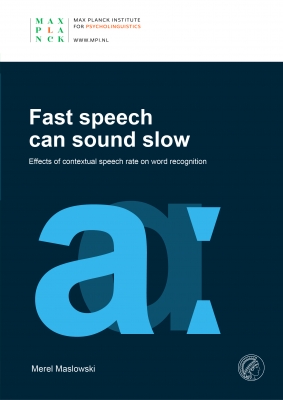Merel Maslowski will defend her thesis Thursday 12th of December 2019

The rate at which people speak is highly variable. However, there is not only substantial variability in how fast people speak, acoustic duration is also a critical cue to many sound contrasts, such as the Dutch vowels short /A/ (as in "mat") and long /a:/ (as in "maat"). That is, the same acoustic material may signal different sound categories, depending on the surrounding speech rate: When speaking fast, individual speech sounds are shorter in duration, compared to when speaking slowly. This poses a challenge for the listener, who has to interpret the speech signal. To accomplish this challenge, listeners need to take speech rate into account during speech processing. That is, they need to normalize for contextual speech rate. Thus, listeners perceive speech relative to the surrounding speech rate context. Merel Maslowski investigated how listeners use different speech rate cues in word recognition. She found that the speech rate context in which words are uttered (and who utters them) can systematically change the way speech is perceived. The results suggest that speech rate effects take place in everyday communication, as they are induced by naturally produced fast and slow speech. Furthermore, the results suggest that speech rate tracking is highly automatic, taking place without explicit attention being drawn to temporally ambiguous words. These findings highlight the complexity of speech comprehension in conversation, which is facilitated by keeping track of different speech rate cues. The distance of these speech rate cues to an ambiguous word plays a part in how listeners process them.
Share this page